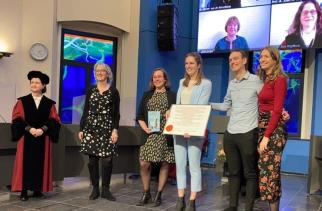Onderzoeker (postdoc) Zorg en Participatie bij Chronische Aandoeningen
Publicatie
Publicatie datum
Evaluating meaningful impact of Patient and Public Involvement: a Q methodology study among researchers and young people with a chronic condition.
Schelven, F. van, Boeije, H., Rademakers, J. Evaluating meaningful impact of Patient and Public Involvement: a Q methodology study among researchers and young people with a chronic condition. Health Expectations: 2022, 25(2), p. 712-720.
Lees online
Introduction
Although Patient and Public Involvement (PPI) of young people with a chronic condition (YPCC) is receiving increasing attention, evidence of impact is lacking. This is partly due to inadequate understanding of what meaningful impact entails. This study aimed to gain an in-depth understanding of researchers’ and YPCC's perspectives on meaningful impact.
Methods
We conducted a Q methodology study in a group of 26 researchers and a group of 20 YPCC with experience in PPI. Participants ranked statements about impact (e.g., ‘YPCC acquire new knowledge and skills’) based on their agreement with them. During interviews, they reflected on their rankings (Q sorts). Factor analysis was conducted to identify similar patterns in the individual Q sorts. The interviews were used to determine and interpret the final factor solution. The resulting factors represented distinct perspectives on meaningful impact.
Results
Four distinct perspectives on meaningful impact of PPI were identified. Two were predominantly based on the Q sorts of researchers, for example improving research quality and facilitating dialogue and understanding, and two on the Q sorts of YPCC, for example achieving equality and inclusivity and doing justice to YPCC's rights. The factors were defined by 37 Q sorts (80%); 9 Q sorts did not load significantly on any of the factors.
Conclusion
The results indicate that researchers and YPCC can have different views about the meaningful impact of PPI. The perspectives identified here can serve as an aid when discussing these different views and formulating operational indicators of impact.
Patient or Public Contribution
An adolescent with a chronic condition was involved in the early phases of this study. She helped in formulating the statements and recruiting YPCC.
Although Patient and Public Involvement (PPI) of young people with a chronic condition (YPCC) is receiving increasing attention, evidence of impact is lacking. This is partly due to inadequate understanding of what meaningful impact entails. This study aimed to gain an in-depth understanding of researchers’ and YPCC's perspectives on meaningful impact.
Methods
We conducted a Q methodology study in a group of 26 researchers and a group of 20 YPCC with experience in PPI. Participants ranked statements about impact (e.g., ‘YPCC acquire new knowledge and skills’) based on their agreement with them. During interviews, they reflected on their rankings (Q sorts). Factor analysis was conducted to identify similar patterns in the individual Q sorts. The interviews were used to determine and interpret the final factor solution. The resulting factors represented distinct perspectives on meaningful impact.
Results
Four distinct perspectives on meaningful impact of PPI were identified. Two were predominantly based on the Q sorts of researchers, for example improving research quality and facilitating dialogue and understanding, and two on the Q sorts of YPCC, for example achieving equality and inclusivity and doing justice to YPCC's rights. The factors were defined by 37 Q sorts (80%); 9 Q sorts did not load significantly on any of the factors.
Conclusion
The results indicate that researchers and YPCC can have different views about the meaningful impact of PPI. The perspectives identified here can serve as an aid when discussing these different views and formulating operational indicators of impact.
Patient or Public Contribution
An adolescent with a chronic condition was involved in the early phases of this study. She helped in formulating the statements and recruiting YPCC.
Introduction
Although Patient and Public Involvement (PPI) of young people with a chronic condition (YPCC) is receiving increasing attention, evidence of impact is lacking. This is partly due to inadequate understanding of what meaningful impact entails. This study aimed to gain an in-depth understanding of researchers’ and YPCC's perspectives on meaningful impact.
Methods
We conducted a Q methodology study in a group of 26 researchers and a group of 20 YPCC with experience in PPI. Participants ranked statements about impact (e.g., ‘YPCC acquire new knowledge and skills’) based on their agreement with them. During interviews, they reflected on their rankings (Q sorts). Factor analysis was conducted to identify similar patterns in the individual Q sorts. The interviews were used to determine and interpret the final factor solution. The resulting factors represented distinct perspectives on meaningful impact.
Results
Four distinct perspectives on meaningful impact of PPI were identified. Two were predominantly based on the Q sorts of researchers, for example improving research quality and facilitating dialogue and understanding, and two on the Q sorts of YPCC, for example achieving equality and inclusivity and doing justice to YPCC's rights. The factors were defined by 37 Q sorts (80%); 9 Q sorts did not load significantly on any of the factors.
Conclusion
The results indicate that researchers and YPCC can have different views about the meaningful impact of PPI. The perspectives identified here can serve as an aid when discussing these different views and formulating operational indicators of impact.
Patient or Public Contribution
An adolescent with a chronic condition was involved in the early phases of this study. She helped in formulating the statements and recruiting YPCC.
Although Patient and Public Involvement (PPI) of young people with a chronic condition (YPCC) is receiving increasing attention, evidence of impact is lacking. This is partly due to inadequate understanding of what meaningful impact entails. This study aimed to gain an in-depth understanding of researchers’ and YPCC's perspectives on meaningful impact.
Methods
We conducted a Q methodology study in a group of 26 researchers and a group of 20 YPCC with experience in PPI. Participants ranked statements about impact (e.g., ‘YPCC acquire new knowledge and skills’) based on their agreement with them. During interviews, they reflected on their rankings (Q sorts). Factor analysis was conducted to identify similar patterns in the individual Q sorts. The interviews were used to determine and interpret the final factor solution. The resulting factors represented distinct perspectives on meaningful impact.
Results
Four distinct perspectives on meaningful impact of PPI were identified. Two were predominantly based on the Q sorts of researchers, for example improving research quality and facilitating dialogue and understanding, and two on the Q sorts of YPCC, for example achieving equality and inclusivity and doing justice to YPCC's rights. The factors were defined by 37 Q sorts (80%); 9 Q sorts did not load significantly on any of the factors.
Conclusion
The results indicate that researchers and YPCC can have different views about the meaningful impact of PPI. The perspectives identified here can serve as an aid when discussing these different views and formulating operational indicators of impact.
Patient or Public Contribution
An adolescent with a chronic condition was involved in the early phases of this study. She helped in formulating the statements and recruiting YPCC.



